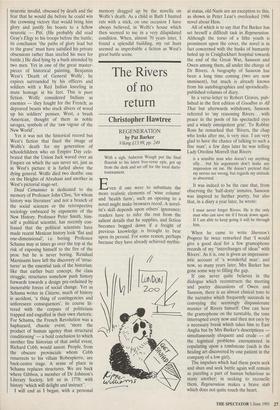The Rivers of no return
Christopher Hawtree
REGENERATION by Pat Barker Viking £13.99, pp. 249
With a sigh, Auberon Waugh put the final flourish to his latest free-verse epic, got up from the desk and set off for the local darts- tournament.
Even if one were to substitute the more realistic elements of 'wine column' and 'health farm', such an opening to a novel might make browsers recoil. A novel- ist's skill depends upon others' ignorance; readers have to infer the rest from the salient details that he supplies, and fiction becomes bogged down if a freight of previous knowledge is brought to bear upon its perusal. For some reason, perhaps because they have already achieved mythic- al status, old Nazis are an exception to this, as shown in Peter Lear's overlooked 1986 novel about Hess.
All of which is to say that Pat Barker has set herself a difficult task in Regeneration. Although the torso of a lithe youth is prominent upon the cover, the novel is in fact concerned with the husks of humanity holed up in Craiglockhart hospital towards the end of the Great War, Sassoon and Owen among them, all under the charge of Dr Rivers. A biography of Sassoon has been a long time coming (two are now imminent), but much is already known from his autobiographies and sporadically- published volumes of diary.
In a verse-letter to Robert Graves, pub- lished in the first edition of Goodbye to All That but afterwards withdrawn, Sassoon referred to 'my reasoning Rivers. . . with peace in the pools of his spectacled eyes and a wisely omnipotent grin'. To Robbie Ross he remarked that 'Rivers, the chap who looks after me, is very nice. I am very glad to have the chance of talking to such a fine man'; a few days later he was telling Lady Ottoline Morrell that Rivers
is a sensible man who doesn't say anything silly... but his arguments don't make any impression on me. He doesn't pretend that my nerves are wrong, but regards my attitude as abnormal.
It was indeed to be the case that, from observing the 'half-dotty' inmates, Sassoon was inspired to further poetry, but also that, in a diary a year later, he wrote: I must never forget Rivers. He is the only man who can save me if I break down again. If I am able to keep going it will be through him.
When he came to write Sherston's Progress he twice remarked that 'I would give a good deal for a few gramophone records of my "interchanges of ideas" with Rivers'. As it is, one is given an impression- istic account of 'a wonderful man'; and now, so many years later, Mrs Barker has gone some way to filling the gap.
If one never quite believes in the dialogue which reconstructs the meeting and poetry discussions of Owen and Sassoon, there is an almost clinical tone to the narrative which frequently succeeds in conveying the seemingly dispassionate manner of Rivers himself. One can hear the gramophone on the turntable, the tone interrupted every now and then not only by a necessary break which takes him to East Anglia but by Mrs Barker's descriptions simultaneously eloquent and crude — of the logistical problems encountered in copulating upon a tombstone (such is the healing art discovered by one patient in the company of a low girl).
The impulses which had these poets seek and shun and seek battle again will remain as puzzling a part of human behaviour as many another; in seeking to reconcile them, Regeneration makes a brave stab which does not quite touch the heart.


















































 Previous page
Previous page